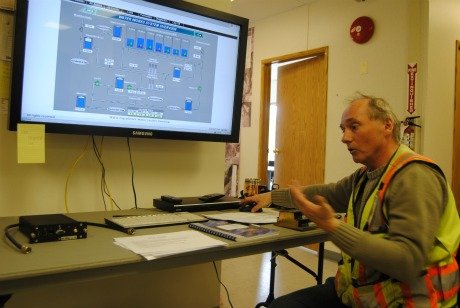
By Gagandeep Ghuman
Published: April 13, 2012.
It helps the district save money and time, and more than anything else, it helps spread calm in a setting where beeping red alarms are on the ready to create panic.
Scada, or Supervisory Control and Data Acquisition System, is used by the district to monitor and controls industrial systems in Squamish.
It might be a highly technical set up that monitors and controls infrastructure processes, but it saves the tax payers staff overtime, and creates quicker, and targeted response to problems in the district infrastructure.
District of Squamish had installed Scada in the early 2000s, but last year, it brought more than 50 of its outstations under SCADA control.
This year, the district took a step further, and brought almost all outstation controls under the Scada system.
Now, from the comfort of their office or even their homes, district operations staff can pinpoint the exact location of a problem in any of the water, drainage, or sanitary system.
In a trailer next to the dog yard on Government Road, Tom Green, the district’s Scada incharge, keeps a close eye on the changing symbols on the Scada screen.
Six water reservoirs, drainage pump stations, and four chlorine monitoring stations are just some of the infrastructure stations he monitors every day.
The screen tells him exactly what stations are running smoothly, and what needs to be checked out.
Scada has made life easier for operators, says Bob Smith, the district’s operations manager.
Before Scada, an alarm system would alert the operators about a problem. An operator would have to drive up there, sometimes early in the morning, just to realise it didn’t merit the attention.
Now, the operator can simply turn if off remotely from his home, and deal with it later. It saves the district on overtime and hassle, Smith says.
“We monitor it very closely, and everything is visually represented,” Smith says pointing to the big TV screen in the room.
“If something ever needs attention, the Scada network will notice that, and send out an alarm to the blackberry, and to our local call centres which will be paged out to operators.”
Scada also keep record of historical data, so operators would know, for example, the water flow level in the reservoirs. This is the kind of information that can useful in an emergency, he added.
Staff is also aware of the level at which a system would max out so it can be adjusted before an alarm goes off.
“There are a lot of municipalities that don’t have this, and so it’s significant we have this to monitor and control out infrastructure from the officer of the home” says Green.
“This has brought a lot of calm here.”


Jeff says
What a great system. I am impressed with the foresight District employees had in 2000, when water and water treatment issues were not such a top priority. I am glad to see the District employees are working hard trying to develop efficiencies. Thanks to the employees who implemented and monitor this system, my tax bill will appreciate it.